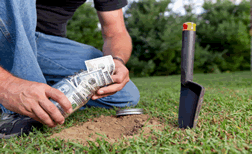One of the biggest threats to your credit rating – not to mention your family’s
financial security – is the big, unexpected expense that you have to charge on your credit card and can’t pay back
quickly. Medical bills and emergency car repairs are just two examples of sudden expenses that can wreak havoc on
your finances. As the balance rises on your credit cards, so does the minimum payment. And if you’re unemployed or
unable to work because of a disability or medical condition, the situation will only get worse.
That’s why it’s so important to have an emergency fund in place. But if money is
tight and/or you’re not really all that disciplined when it comes to dealing with money, how can you talk (or
trick) yourself into saving money for your emergency fund?
Start small – as in “small change” and small bills
When you spend cash, bring the change home and put it in a jar instead of spending
it. Those quarters and dimes can add up and help a little when things get tight.
It’s also a good idea to have a little stash of smaller bills, such as ones and
fives, for those times when your child needs money for a school trip or class party (both of which tend to happen
when you’re out of cash) or you need to take a taxi.
Pay yourself before you pay bills (or shop)
If you’re a freelancer or don’t have a steady income, you should treat your savings
account deposit like a bill. Pay yourself first – any amount is better than nothing at all. And if you think you
can’t afford to save, you may be mistaken: Think about something you could do without, such as meals at fast food
restaurants or that weekly trip to the mall. And if you have a steady income that’s direct-deposited into your bank
account, consider having some portion of it automatically deposited into your savings account so you’re not even
tempted by it.
Use windfalls to pad your emergency fund
As I’m writing this blog post, it’s the very beginning of tax season. If you know
you’re getting a tax refund, allocate at least part of it to your emergency fund. Bonuses from work, cash gifts
from family or friends, or other financial windfalls are also good candidates for depositing into your emergency
fund.
How much of an emergency fund is enough?
Most financial experts agree that $1000 is the bare minimum for an emergency fund,
and three to six months of expenses is ideal. Some financial gurus recommend socking back an extra month’s worth of
expenses for each dependent.
That’s good advice, even if it is a little daunting. But don’t let the size of your
goal keep you from starting an emergency fund right now, with whatever money you have on hand. The point of an
emergency fund is to have a plan in place for dealing with as much of the emergency expense as possible with
cash.
And in the meantime, if your credit cards are your current “backup plan,” be sure
the balances are paid down as much as possible to free up your credit until your emergency fund is a decent
size.








Leave a Comment